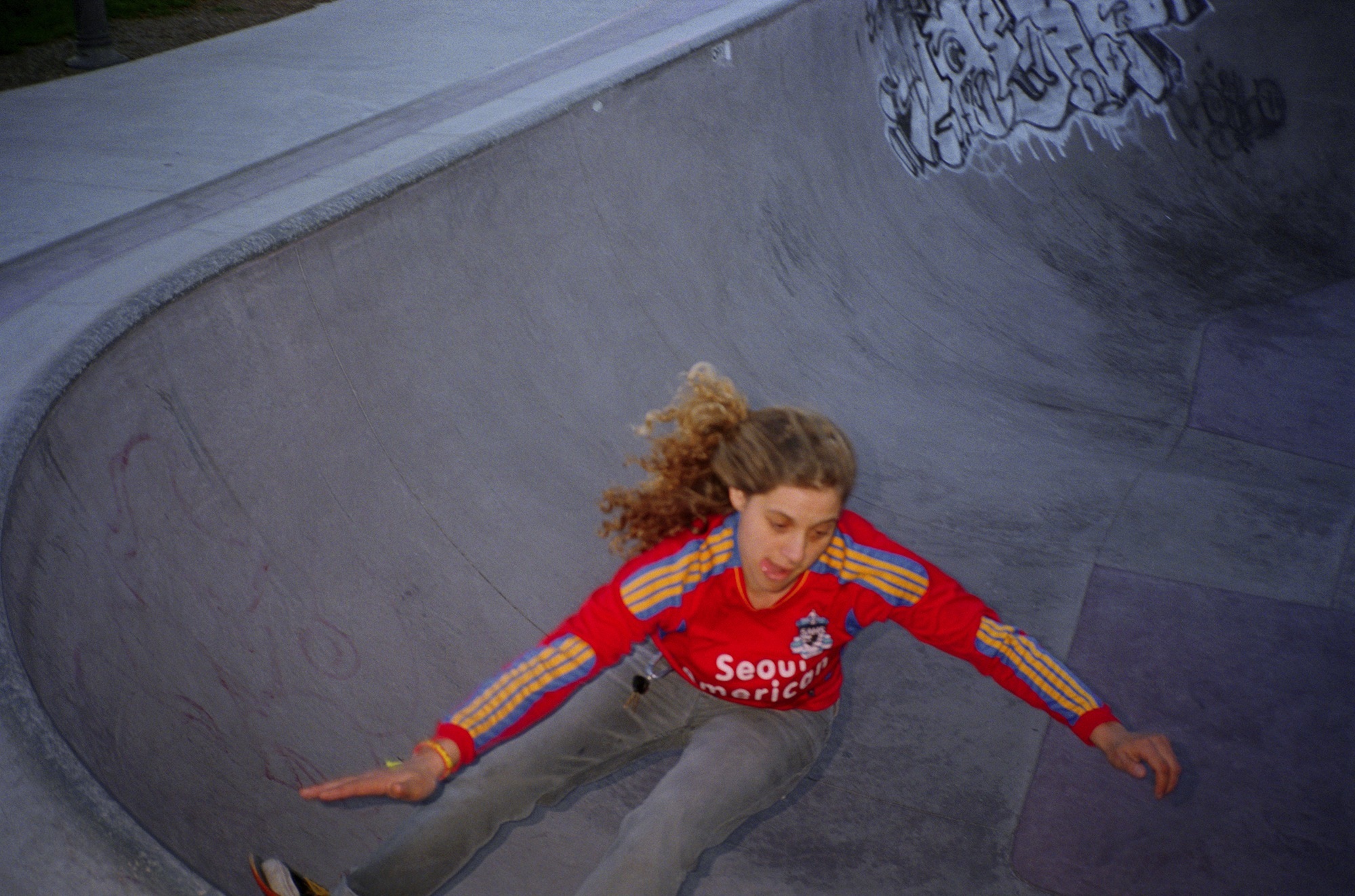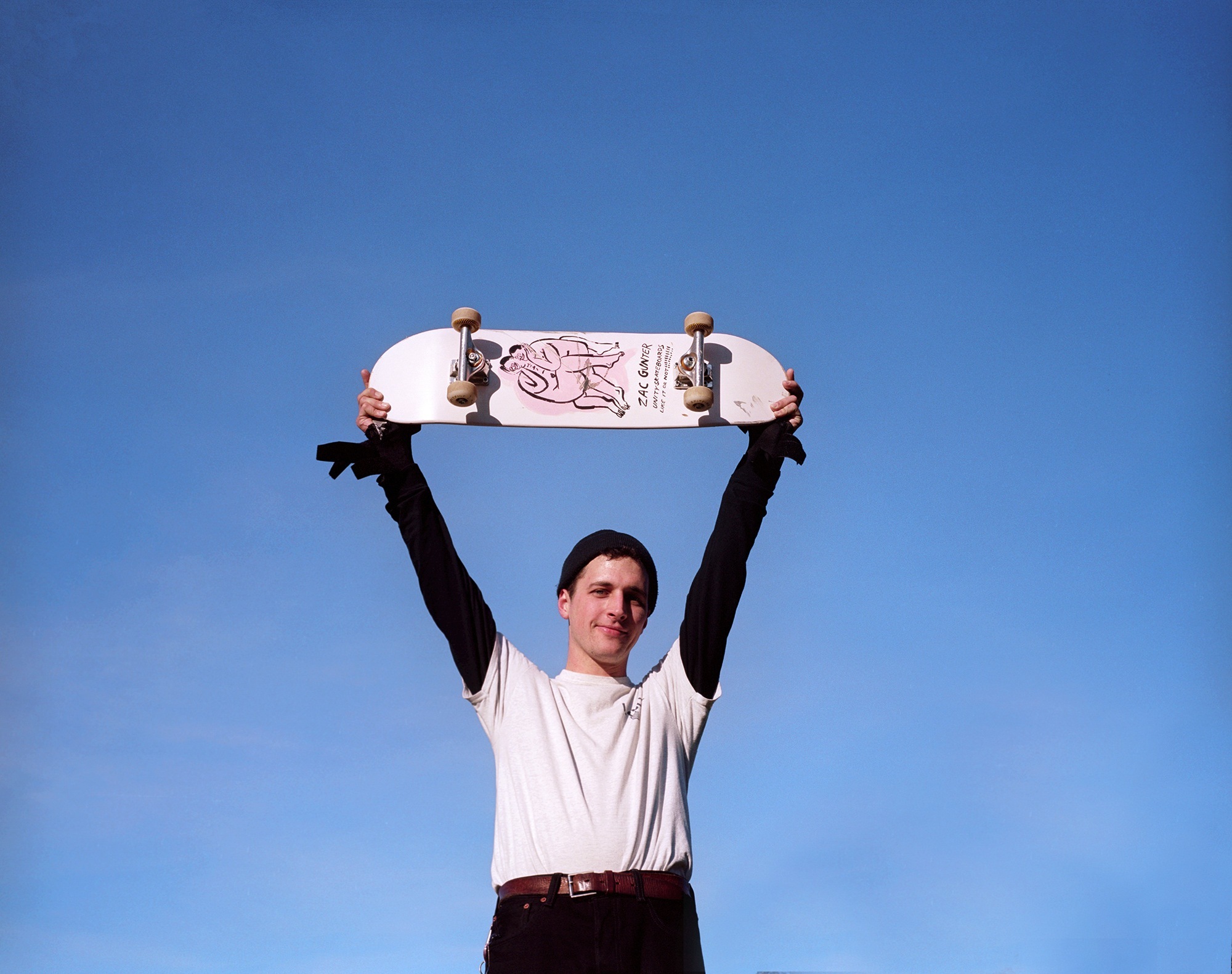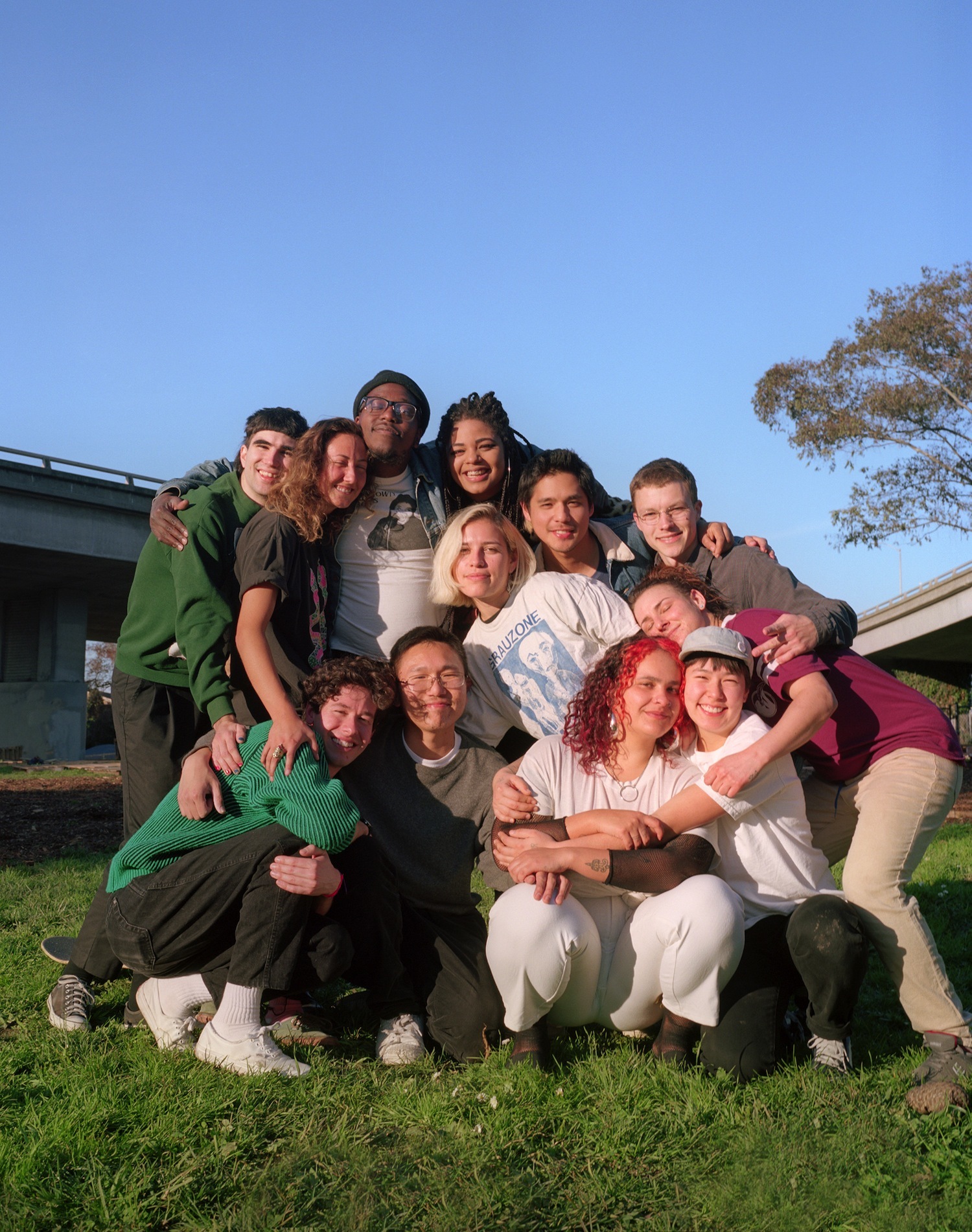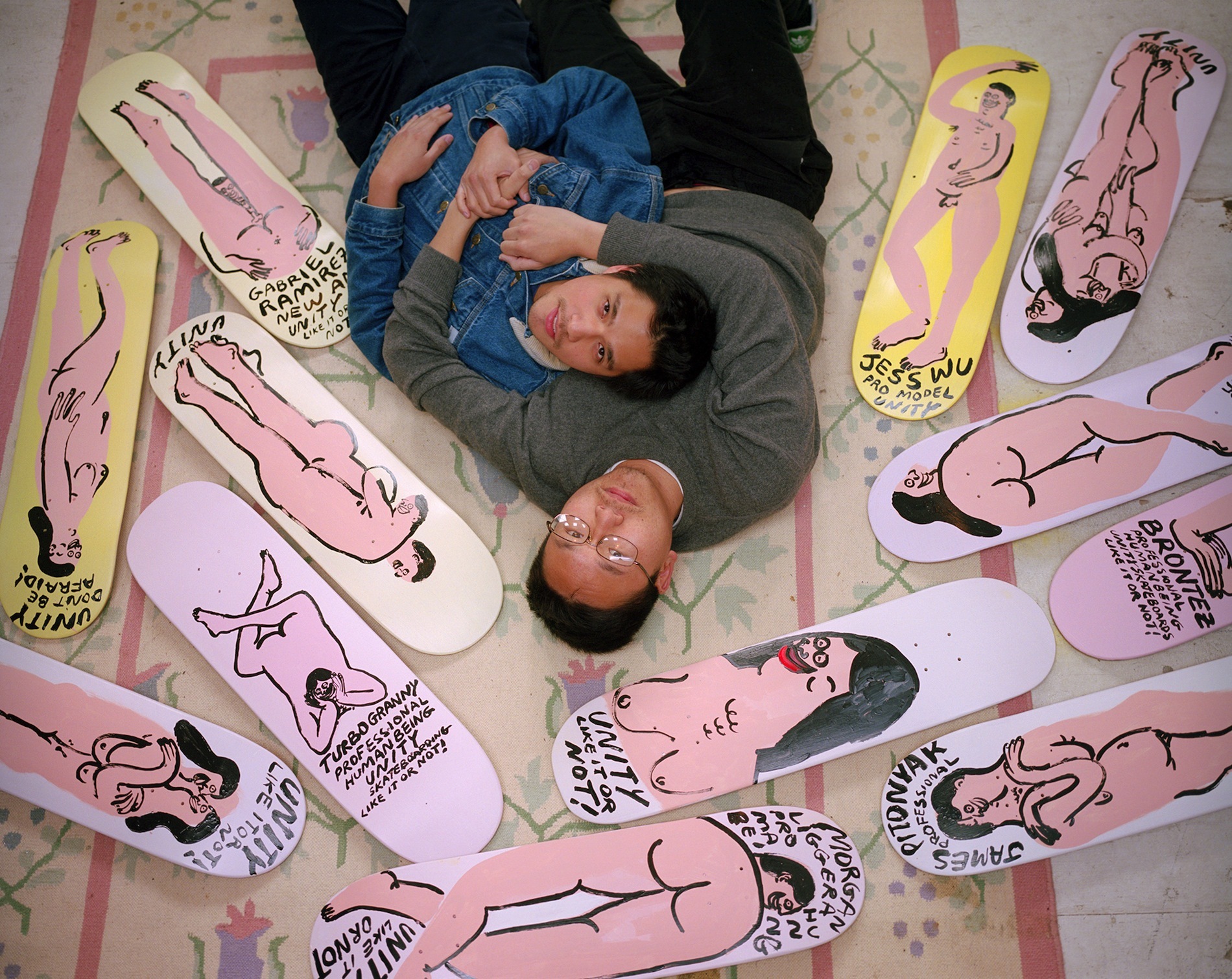In the 1970s, a group of Southern California surf rats re-wrote the rules of skateboarding — radically shifting its focus from technical, precise competition routines to empty pool-ripping anarchy. These Z-Boys (chiefly Tony Alva, Stacey Peralta, and Jay Adams) established the template for much of what defines skate mentality today: a simultaneous sense of individualism and community, defiance against arbitrary systems of authority, a proud resistance to conformity. And yet — in spite of all the creativity and free-spiritedness rooted in skating’s ethos — it has a history of marginalization, too. Evidenced by rarely-discussed events of Adams’s life, but also by the fact that before six months ago, there was no openly queer professional skateboarder.
Brian Anderson — god of the front blunt whose fearlessness on four wheels earned him Thrasher’s Skater of the Year — publicly came out in September. He did so in a moving Vice Sports video, which discusses the culture’s history of homophobia with frankness and, more importantly, empathy. Though Anderson had spoken about his sexuality with many of his close friends and fellow skaters years ago, the video’s public reveal was met with a truly massive outpouring of support, and has, hopefully, inspired some real change. Yet — as the rich history of queer liberation makes plain — our community knows the vitality of resistance and struggle, but also the importance of pride and celebration. That’s what makes Unity Skateboards, a new California-based company, so important.
Jeffrey Cheung is an artist who has lived and skated in the Bay Area throughout his entire life. “Towards the end of high school I would go to figure drawing classes at night with friends and started getting really into that. I enjoyed drawing people, portraiture, and the body form,” he explains of his earliest artistic inclinations, ones that still profoundly shape his practice. Cheung renders these naked, ecstatic bodies — smiling figures of all sizes and skin tones, often depicted embracing others — on canvases, in self-published zines, and now, on skate decks.
Though Cheung says the desire to start his own skate company only struck about a month ago, its all-inclusive, proudly queer ethos has already united a solid crew of skaters. Some Unity team members include Chelsey Del Castillo and Jess Wu, who both make excellent zines (Mixed Rice considers intersections of queerness and multi-ethnic Asian identity; Not Shit is, as its title suggests, definitely not shit). Louise Alban carves like crazy when she’s not shooting tripped-out photographs in the California desert. This summer, Brontez Purnell will release his debut novel. Stevie Shakes has a mean kickflip; Turbo Granny fucking rips in the bowl. Cheung has hand-painted pro models for each of these humans, and many others. Decks depict butts, boobs, hugs, and messages like “Unity: together as one.” They’ll be available this weekend, when Unity celebrates its official launch at Oakland’s newly christened Unity Mart.
We caught up with Chueng as his decks dry to talk about creativity, community, and his hopes for skating’s future.

When did you first begin painting, drawing, printmaking, and what initially drew you to creating visual art?
My grandmother was a traditional Chinese watercolor painter, but I feel like I was never too close with her when I was younger. I have always enjoyed drawing, though; as a kid, some of my favorite subjects were trees and Pokemon. I feel like most children are drawn to visual art at some point, but some people just hold onto those tendencies as they get older. I studied studio art in college, but I really started to develop the work I’m doing now when I moved back home and enrolled in a free queer printmaking workshop in San Francisco, taught by Katie Gilmartin. I was also using the print studio at Laney College during that time; I really enjoyed making work and developing at my own pace.
Are there any ideas or themes that consistently inspire you?
I think it all mostly comes from me dealing with my sexuality. Lately, I feel like I have a better understanding of it. I think I used to have a lot of internalized shame, and depicting these bodies and situations was an another outlet in a way to help me come to terms when I was younger. But I’ve have slowly realized that it is really about celebrating love and sexuality, and being unashamed of your body and who you are.
What do you enjoy the most about making and publishing zines as Unity Press, as opposed to working in other media?
I started making zines not too long ago, maybe four years now? My partner Gabriel and I started Unity Press as a name to publish our own zines under, which eventually lead to publishing other artist’s zines. The best thing about zines is that they are accessible and you have total freedom to put whatever content down on your pages without censorship. I think it is similar to skateboarding in that it encourages individuality and independent thought. Now that there is the internet flooding iPhones and laptops with information, it makes zines a little more precious and significant. Everyone should make zines; it is a great way to spread your ideas to the world, whatever they are.

What motivated you to start your own skate company?
I think I first got the idea about a month ago when I started skating with Stevie and Trevor. I haven’t met many other queer skaters in real life before and I got really excited. We started skating together and I thought it would be fun to start a queer skate crew. Turns out we knew tons of other queer people that skate and I decided maybe I would just hand paint boards — it sort of just went from there. Of course, Brian Anderson officially coming out, Lacey Baker, all the female skaters and companies were a big inspiration as well. I thought about myself when I was a teenager — that it would have been so life changing for me if there was a queer skate company with gay skaters. It would have been reaffirming of who I was during a very confusing and challenging time, and I feel that is the same for most queer teenagers. So that is what I hope Unity Skateboards will be for queer youth and queer people out there: an encouraging and positive force. Also with everything going on in the country and the world, I have a little more motivation to try to create something positive and contribute back to the community.
Why was it important that Unity be all-inclusive, but especially for queer minded skaters?
It started with the idea of promoting queerness in skateboarding, and I think it is very important to emphasize the queer aspect and prioritize queer skaters. Being queer is a mindset and not necessarily a sexuality. I am hoping that by being an all-inclusive project, it could be a bigger idea than a gay skate company — and that we can break down barriers together.
Tell me about some of the skaters you’ve brought together for the Unity team. How do you all know each other, and what do you admire most about each of them?
I already knew some of the Unity skaters through art, zines, or music, but rarely in the context of skating. Others were friends of friends or acquaintances — we even had one person reach out to us and send us a sponsor me tape! The word just kind of got out and everyone seemed stoked on the idea. Some of us have been skating for a long time and others more just starting out, but everyone seems to share the same level of enthusiasm regardless, which I admire and keeps it fun and fresh. One of my only goals I had for starting this project was to reach queer skaters outside my immediate circle, and it is pretty magical how it all came together so quickly. I hope it continues to reach even further. I am so grateful for everyone involved so far. Without them, this idea would have always been just an idea, but now it feels real.

Brian Anderson came out just a few months ago. Have you seen any kind of shift in attitude or more acceptance among other skaters?
I have been out of the loop with the skate scene for a while, but it seems like it has gotten a little better. I was lucky enough that my skate friends growing up were also some of the first people I ever came out to, and were accepting of me. I know that is not the case for everybody, so I am very happy to see that Brian Anderson has received a tremendous amount of support since coming out. I think that makes a big difference in the skate world and especially for queer teens coming out today. It’s funny that skateboarding — which is something that stemmed from going against the mainstream — can also be so much a part of that same heteronormative culture. Unfortunately, there are a lot of ignorant and close-minded people out there, but I have faith in the momentum that is happening and am appreciative of that. I know I can’t be the only one who is inspired to do something like this; there must be many other queer skate projects in the works right now, and I hope the future of skateboarding will be more accessible for women and queer people of color.
What are your plans and hopes for Unity’s future?
Unity Skateboards is very small at the moment and has a limited amount of supply — I am literally hand painting every board — but if you are queer-identified and are interested in getting involved, please send us a message or sponsor me tape! I really hope to reach out to more queer people who skate or want to skate. I want to encourage queer youth out there to skate and know that you are not alone and that there are many of us and we can be a very powerful force. Together we can help take down homophobia, sexism, racism, and the patriarchy. Unity Queer Skateboarding, like it or not!
Celebrate Unity Skateboarding’s launch at its new store, Oakland’s Unity Mart, on Sunday, February 12, from 3-6 PM. More information here.

Credits
Text Emily Manning
Photography Vivian Fu
